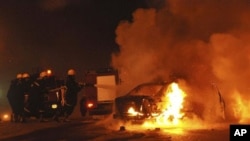Eyewitnesses say at least 21 people have been killed and scores wounded in a suicide bombing attack at a Coptic Christian church in Alexandria, Egypt. Tensions between Christians and Muslims have been on the rise in Egypt and nearby Iraq following recent threats by the al-Qaida terrorist group.
Egyptian President Hosni Mubarak denounced the explosion at a Coptic church in the port city of Alexandria overnight, calling on Christians and Muslims to unite in confronting such acts of terrorism.
He says that this act of terrorism points to the involvement of foreign gangs that wish to turn Egypt into a terrorist playground in the region. He warns that he and the Egyptian people will stop these forces from carrying out their plots to destabilize the country and destroy the cohesion and unity of its people. The plotters, he adds, will ultimately be captured and punished.
People inside All Saints Coptic church began screaming after the initial blast, as a priest urged them to stay calm. The New Year's eve midnight mass had just drawn to a close and worshippers were preparing to leave. Many of those who began leaving early were either killed or wounded.
Firemen doused the flames after the blast while friends and rescue workers ferried the wounded to local hospitals.
A heavy set man who was burned across his face explains what happened, saying he was leaving the church when he felt a massive explosion. He said he was dazed by the force of the blast and woke up in the hospital.
The Egyptian Interior Ministry issued a statement saying the explosion was caused by a suicide bomber although several eyewitnesses claim a car bomb was responsible for the blast.
Other eyewitnesses say angry Coptic Christians tried to attack a mosque across from the church after the explosion and that fights broke out, causing more casualties. Al-Arabiya TV showed a crowd of mostly young Coptic men waving their fists and shouting as police intervened.
The local TV news channel, Nile News, reported that despite the angry reactions of many people, dozens of ordinary Egyptians rushed to area hospitals to donate blood for victims of the blast.
The Sheikh of Egypt's venerable al-Azhar University, Ahmed Tayeb, condemned the explosion, insisting it was carried out by evil outside forces trying to damage the image of Islam.
He says that al-Azhar expresses its deep sorrow for this odious crime which troubles everyone's conscience. No Egyptian, he insisted, could have committed such an act, which was the deed of outside forces. He said that such people are strangers to Islam, because attacking a church is to attack a house of worship. Such people, he added, are aiming to damage the image of Islam in the West and create sectarian strife in the streets of Arab and Islamic countries.
Former United Nations Secretary General Boutros Boutros Ghali also condemned the explosion. He told Egyptian TV that this type of explosion takes place regularly in Pakistan, Afghanistan and Iraq, but is not a normal event in Egypt. He said such acts must not be allowed to proliferate.
Said Sadek, who teaches political science at the American University of Cairo, argues that the danger of the explosion is that it could set off further sectarian violence between Muslims and Christians.
"Alexandria has been a bastion of the Muslim brotherhood and there is a lot of extremism in Alexandria anyway and so we saw the reaction afterwards," said Sadek. "You saw attacks by the Copts at a nearby mosque because they felt maybe the Muslims are happy with what happened and so they made their attack and then the Muslims attacked back. So the real alarm is the reaction afterwards from the people in the area."
Sadek points out that many of the underlying sectarian conflicts in Egypt, including building churches, freedom of religion, and conversions between one faith and another are difficult to resolve. "No one is addressing these problems," he notes, "because there are no easy solutions."

